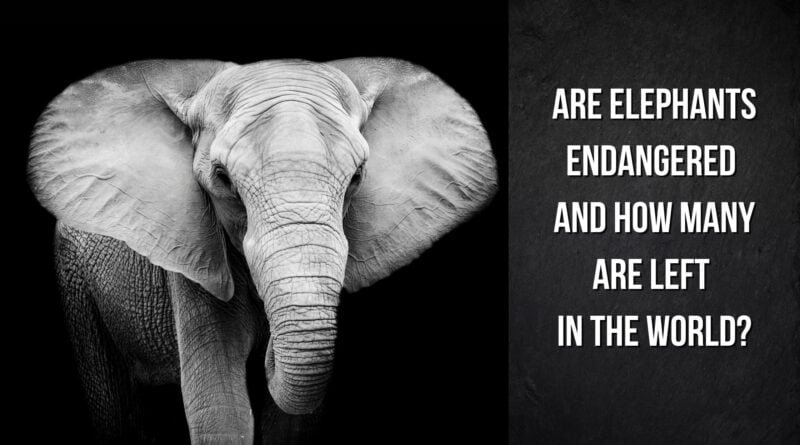Are elephants endangered species and how many elephants are left in the world?
The answer to this question is unfortunately, yes. Elephants are classified as endangered by the International Union for the Conservation of Nature (IUCN). This means that they are at risk of becoming extinct in the wild. But, why are elephants endangered species? The main threat to elephants is poaching. Poachers kill elephants for their ivory tusks, which are then sold on the black market. Other body parts, such as their tails and feet, are also prized by poachers.
The demand for ivory is high, and as a result, elephants are being killed at an alarming rate. It is estimated that around 100 African elephants are killed each day. At this rate, elephants could disappear from the wild within our lifetime.
This is a tragedy not just for elephants, but for us humans as well. Elephants play an important role in their ecosystems. They help to keep the landscape healthy by spreading seeds and disturbing the soil with their feet. This allows new plants to grow, which provides food and shelter for other animals. Without elephants, these ecosystems would begin to collapse, impacting all the creatures that rely on them for survival – including us.
As of 2022, it is estimated that there are only around 400,000 elephants remaining in the wild. This number continues to decline each year. We need to do something to save these majestic creatures before they disappear completely.
There are a number of ways that you can help to protect elephants. One way is to support organizations that are working to end poaching and trafficking of ivory. You can also help by spreading awareness about the issue and encouraging others to take action. Together, we can make a difference and ensure that elephants will still be roaming the earth for generations to come.
Where do elephants live?
Elephants are found in a number of different habitats, including grasslands, forests, and savannas. They are also known to live in marshy areas and desert regions. The largest population of elephants is found in Africa, where they roam across many different countries.
What can be done to help?
There are a number of things that can be done to help protect elephants. One way is to support organizations that are working to end poaching and trafficking. Another is to spread awareness about the issue. You can also help by not buying products that contain ivory.
We need to act now to save elephants. These incredible creatures are an important part of our world, and we cannot let them disappear.

What is the average lifespan of an elephant?
The average lifespan of an elephant is around 70 years. However, they can live to be much older than that in captivity. The oldest recorded elephant was 62 years old when she died in 2008.
How many calves does a female elephant have?
A female elephant will usually give birth to one calf at a time. However, there have been instances where she has given birth to two or even three calves. twins are very rare, but they have been known to happen.
What is the average weight of an elephant?
The average weight of an elephant is around 11,000 pounds. However, they can range in size from around five feet tall to nearly seven feet tall. The largest recorded elephant was 24 feet long and weighed over 24,000 pounds!
As you can see, elephants are amazing creatures. They are also very endangered. We need to do something to save them before it’s too late.
Conclusion
How many elephants are left in the world and why are elephants endangered species? With poaching continuing at an alarming rate, it is estimated that there are only around 400,000 elephants remaining in the wild. That number continues to decline each year. We need to take action now to protect these majestic creatures. You can help by supporting organizations that are working to end poaching, spreading awareness about the issue, and not buying products that contain ivory. Together, we can make a difference and ensure that elephants will still be roaming the earth for generations to come.















